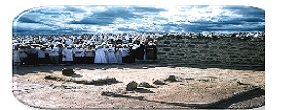The martyrdom of Imam al-Baqir
The martyrdom of Imam al-Baqir

In 100 A.H., Hisham bin Abdul Malik became the Caliph. He was a known enemy of the Ahle Bait (pbuth) and he did not waste any opportunity to bring hardship to the Ahle Bait (pbuth). Allame Majlisi writes that during the last days of his caliphate, Hisham came to Mecca for Hajj. Imam Mohammad baqir (pbuh) and his son Imam Jafar Sadiq (pbuh) were also present. Hisham was informed that Imam Jafer Sadiq (pbuh) delivered a sermon among the Pilgrims that he and his father were the Allah's vicegerent and His command on earth and whoever was their friend and well wisher will go to heaven and whoever is their enemy will be destined to hell. This infuriated Hisham and when he reached Damasacus, he ordered the governor of Medina, Ibrahim bin Walid to send the two Imams (pbuth) to his court. Hisham had planned to malign the Imams in his court but the Imams (pbuth) overturned his plans which further ignited his enmity and he ordered the Imams (pbuth) to be jailed. While in the jail, Imam Mohammad baqir (pbuh) gave sermons to the other prisoners which created an atmosphere of great enthusiasm and devotion towards the Imam (pbuh) and against Hisham and sensing the gravity of the situations and the risk of a revolt, Hisham ordered the release of the Imam (pbuh). He then ordered the governor of Medina that Imam Mohammad baqir (pbuh) should be poisoned as he is becoming a constant threat (Jala-ul-Ayoon Page 262). The governor ofMedina - Ibrahim bin Walid carried out the orders and poisoned the Imam (pbuh) in 114 A.H.
Imam Muhammad baqir (pbuh), lived in this world for a period of 57 years, and in the 114th year of the Hijra, on the seventh day of the month of Zil-Hijjah, in Medina he left this world. His body was buried in Baqi cemetry alongside the graves of Imam Hasan (pbuh) and Imam Sajjad (pbuh) in Medina.
His last will and instructions:
Before his martyrdom, Imam Mohammad baqir (pbuh) instructed his son Imam Jafer Sadiq (pbuh) about several issues and said to him that he is hearing the voice of his father who is calling him (Noor ul Absar Page 131). He gave special instructions for his kafan and burial since only an Imam can say the prayers of an Imam (Shawahi-un-Nabowah page 181). Allama Majlisi stated that in his will, he also mentioned that 800 Dirhams should be spent on his mourning and arrangement should be made that the Hajj pilgrims would commemorate his martyrdom in Medina for the next 10 years. scholars also mentioned that in his will, the Imam (pbuh) also mentioned that his kafan should be opened after his burial and his grave should not be higher that 4 fingers.
Some sayings of the Imam:
(1) Imam said, "Our followers are of three kinds, one who follows us but depends on others, one who is like a glass involved in his own reflections, but the best are those who are like gold, the more they suffer the more they shine.
(2) Another famous saying of the Imam is, “I admonish you regarding five things; if you are wronged, do not commit wrong doing to others, if you are betrayed, do not betray anyone, if you are called a liar, do not be furious, if you are praised, do not be jubilant, if you are criticized do not fret and think of what is said in criticism, if you find in yourself what is criticized about you, then you are falling down in the eyes of God; when you are furious about the truth, it is much greater calamity then your falling down in the eyes of the people. And if you are opposite of what is said (in criticism) about you, then it is a merit you acquired without having to tire yourself in obtaining it.”
Add new comment